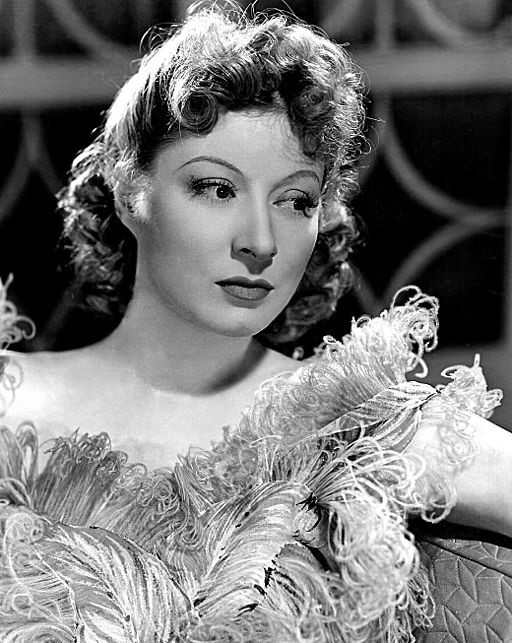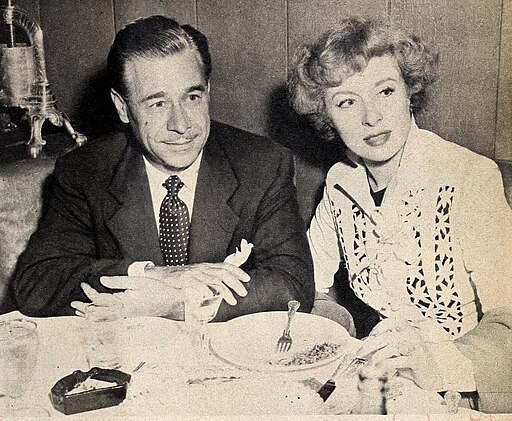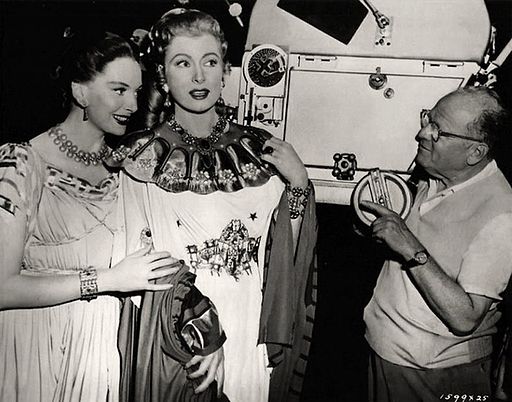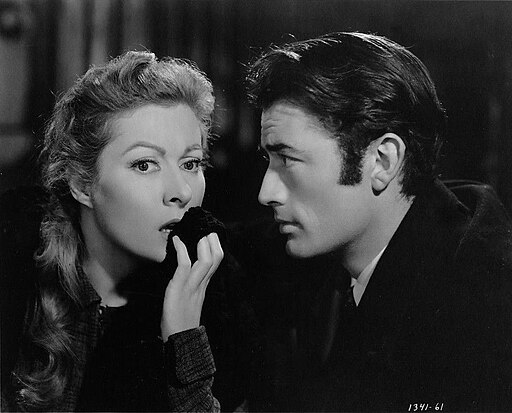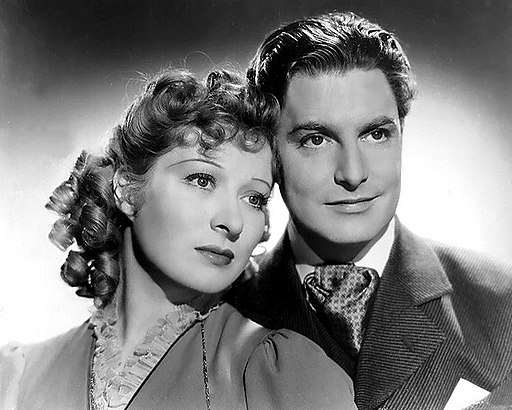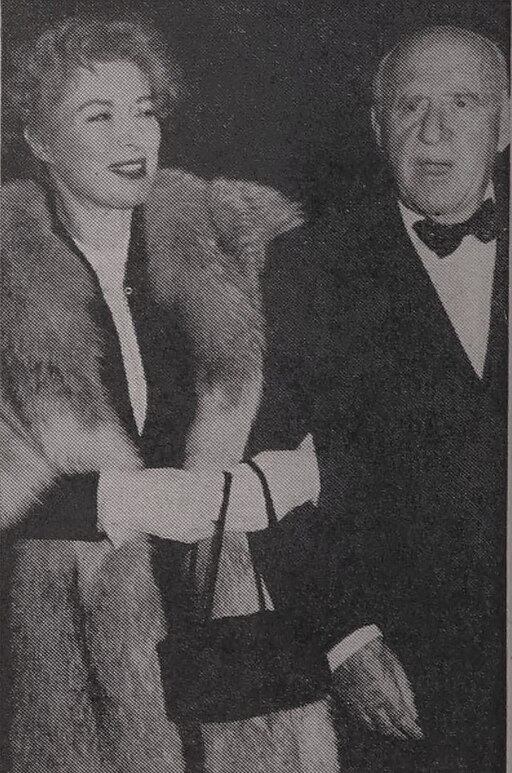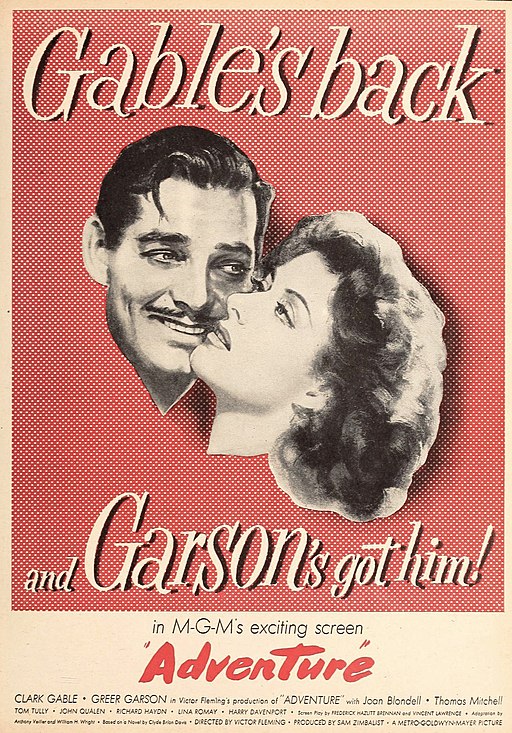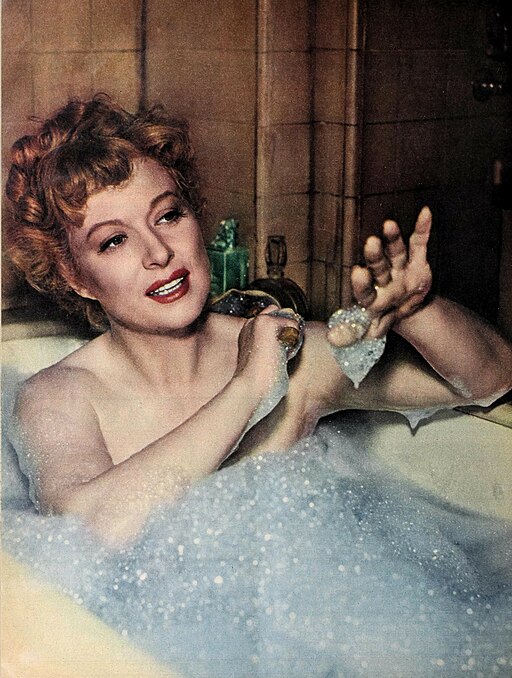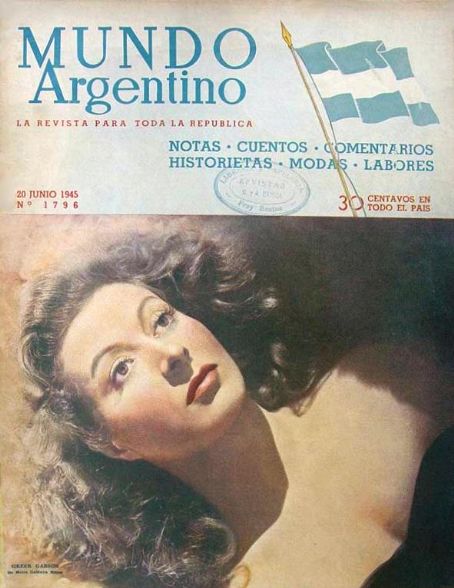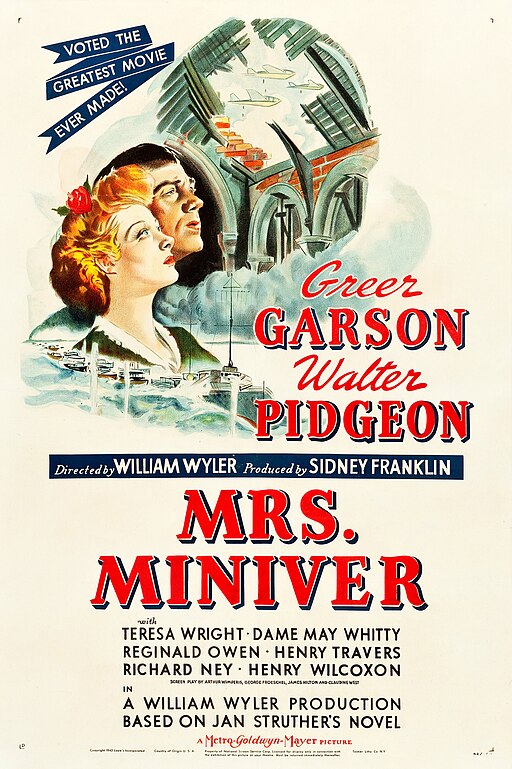Greer Garson
back| Full Name | Eileen Evelyn Greer Garson |
| Stage Name | Greer Garson |
| Born | September 29, 1904 |
| Birthplace | Manor Park, Essex |
| Died | April 6, 1996 |
| Buried | Forest Lawn Memorial Park, Glendale, California, USA |
| Married to | Edward Alec Abbot Snelson (1933–1943; divorced) - Richard Ney (1943–1947; divorced) - E.E. Fogelson (1949 until his death in 1987) |
| Children | Garson had no biological children but was a stepmother to her third husband's children |
| Notable films | Goodbye, Mr. Chips (1939) - Pride and Prejudice (1940) - Mrs. Miniver (1942) - Random Harvest (1942) - Madame Curie (1943) - The Valley of Decision (1945) |
Greer Garson
The Duchess of the Golden Age of Hollywood
Greer Garson was a celebrated actress renowned for her elegance and talent in the Golden Age of Hollywood. After a degree in French and 18th-century literature from King's College London, she transitioned from advertising to theatre and then to film, making a striking debut in "Goodbye, Mr. Chips" (1939).
Garson became one of MGM's brightest stars, known for her dignified and emotionally resonant performances in classics like "Mrs. Miniver" (1942), for which she won an Academy Award, and "Random Harvest" (1942).
Related
Greer Garson (1904 – 1996)
Biography and Career Overview
Eileen Evelyn Greer Garson was born on September 29, 1904, in Manor Park, Essex (now part of London), England. Her father, George Garson, was a commercial clerk, and her mother, Nancy Sophia Greer, was a homemaker. She grew up in a middle-class household and showed an early interest in literature and theatre. Garson was a bright student and pursued higher education at King's College London, where she graduated with a degree in French and 18th-century literature.
Career Beginnings After completing her education, Garson initially worked in advertising, but her passion for acting soon led her to the stage. She made her stage debut in 1932 with the Birmingham Repertory Theatre, a decision that would set the stage for her illustrious acting career. Her performances in local theatre productions caught the attention of MGM scouts, who saw in her a unique blend of elegance and talent.
Hollywood Stardom Garson moved to the United States and made her film debut in "Goodbye, Mr. Chips" (1939), earning her first Academy Award nomination. This film marked the beginning of her successful career in Hollywood, where she became known for her poise, dignity, and versatility. Throughout the 1940s, Garson was one of MGM's biggest stars, captivating audiences in films like "Pride and Prejudice" (1940), "Mrs. Miniver" (1942), for which she won the Best Actress Oscar, and "Random Harvest" (1942). She received a total of seven Oscar nominations, making her one of the most acclaimed actresses of her time.
Personal Life and Marriages Garson was known for her grace both on and off the screen. She married three times: first to Edward Alec Abbot Snelson, a civil servant, in 1933, though they divorced in 1943. Her second marriage was to actor Richard Ney, her co-star in "Mrs. Miniver," in 1943, but this too ended in divorce in 1947. Her final and longest marriage was to E.E. Fogelson, a businessman and rancher, in 1949. They remained married until his death in 1987. Garson did not have biological children but was a stepmother to Fogelson's children.
Passions and Philanthropy Garson was passionate about education and animal welfare. She was a generous philanthropist and contributed to various causes, including higher education and animal rescue. Her grace and elegance were not just confined to her screen presence but were integral to her personal life and charitable endeavors.
Later Years and Death In her later years, Garson's film career slowed down, but she remained active in theatre and television. She also spent her time managing her ranch in New Mexico and involving herself in philanthropic work. Greer Garson passed away on April 6, 1996, at the age of 91, in Dallas, Texas. The cause of her death was reported as heart failure.
Legacy Garson left an indelible mark on the film industry with her memorable performances and her dignified persona. She is remembered not just as a great actress but also as a woman of elegance and compassion. Her contributions to cinema and her philanthropic efforts have ensured her legacy as one of the enduring icons of Hollywood's Golden Age. Greer Garson was often affectionately nicknamed "Duchess" by her colleagues and fans, a moniker that encapsulated her regal bearing, elegant demeanor, and the poised grace she consistently exhibited both on and off screen.
Short Video Biography of Greer Garson:
Greer Garson’s Acting Style:
Greer Garson's acting style was marked by a unique blend of natural grace, emotional depth, and an innate ability to convey complex characters with a dignified and poised presence. Her performances were characterized by several key attributes:
Elegance and Poise: Garson exuded a natural elegance and sophistication on screen. This was not just in her physical appearance but in her mannerisms, speech, and the way she carried herself. She had a regal bearing, which made her perfectly suited for roles that required a dignified and graceful presence.
Emotional Authenticity: One of the hallmarks of Garson's acting was her ability to portray deep emotional experiences in a way that was both authentic and compelling. Whether in romantic dramas like "Random Harvest" or war-time narratives like "Mrs. Miniver," she had a remarkable talent for expressing a range of emotions, from joy and love to sorrow and resilience, in a manner that resonated with the audience.
Intelligent Interpretation of Characters: Garson approached her roles with an intelligent understanding of her characters. She often played strong, independent women with a sense of moral integrity and inner strength. In "Madame Curie," for instance, her portrayal of the Nobel Prize-winning scientist was not only about capturing the external aspects of the character but also about conveying her intellectual vigor and perseverance.
Subtle and Nuanced Performances: Unlike some of her contemporaries who might have relied on more dramatic or overt expressions, Garson's style was often characterized by subtlety and nuance. She had the ability to convey a lot with minimal gestures or changes in expression, which added a layer of sophistication to her performances.
Versatility: While Garson is often remembered for her roles in dramas and romantic films, she also demonstrated considerable versatility. She was equally adept in comedies, as seen in "Julia Misbehaves," where she displayed a keen sense of comic timing and light-heartedness.
Commanding Voice: Garson's voice was another significant aspect of her acting style. She had a distinctive, clear, and resonant voice, which she used effectively to convey a range of emotions and to add depth to her characters. Her diction and enunciation were impeccable, contributing to her portrayal of well-educated and sophisticated women.
Chemistry with Co-stars: Garson had a notable ability to develop strong chemistry with her co-stars, which enhanced her performances. Her on-screen pairings, notably with Walter Pidgeon in several films, were highly regarded for their believability and depth of connection.
Memorable Film Quotes from Greer Garson:
"Mrs. Miniver" (1942)
- "This is the people's war! It is our war! We are the fighters. Fight it then! Fight it with all that is in us, and may God defend the right!"
- This line, delivered by Garson's character, Mrs. Miniver, in a powerful scene, captures the spirit of resilience and courage during World War II.
"Goodbye, Mr. Chips" (1939)
- "Oh, Chips, darling, you mustn't be afraid. It doesn't matter a bit in the dark."
- As Katherine, Garson delivers this line with warmth and affection, capturing the tender relationship between her character and Mr. Chipping.
"Random Harvest" (1942)
- "Smithy, you're home. The past three years were a dream. This is where you belong."
- In this poignant drama, Garson's character, Paula, delivers this line with heartfelt emotion, encapsulating the film's theme of love and memory.
"Madame Curie" (1943)
- "Pierre, we've done it. Radium. New element."
- As Marie Curie, Garson conveys the exhilaration of scientific discovery in this momentous scene.
"Pride and Prejudice" (1940)
- "I could easily forgive his pride if he had not mortified mine."
- Playing Elizabeth Bennet, Garson elegantly delivers this line, capturing the wit and intelligence of Jane Austen's character.
"Blossoms in the Dust" (1941)
- "Every child has the right to live, the right to be wanted, the right to be a person."
- As Edna Gladney, Garson's character passionately advocates for orphaned children, emphasizing the film's message about the dignity and rights of every child.
Awards and Recognition:
Academy Awards (Oscars):
- Won:
- Best Actress for "Mrs. Miniver" (1942)
- Nominated:
- Best Actress for "Goodbye, Mr. Chips" (1939)
- Best Actress for "Blossoms in the Dust" (1941)
- Best Actress for "Madame Curie" (1943)
- Best Actress for "Mrs. Parkington" (1944)
- Best Actress for "The Valley of Decision" (1945)
- Best Actress for "Sunrise at Campobello" (1960)
Golden Globe Awards:
- Nominated:
- Best Actress in a Motion Picture – Drama for "Sunrise at Campobello" (1961)
Emmy Awards:
- While Greer Garson had notable television appearances later in her career, she did not receive Emmy nominations.
Other Honors and Recognitions:
- Garson was also recognized for her contributions to the film industry and philanthropic efforts. While these may not be formal awards or nominations, they are integral to her legacy.
- She has a star on the Hollywood Walk of Fame, an honor that signifies her impact and contributions to the entertainment industry.
- Additionally, Greer Garson's influence extended beyond awards, as she was highly regarded for her philanthropic work, especially in the fields of education and animal welfare.
Movies featuring Greer Garson:
1939: "Goodbye, Mr. Chips"
- Synopsis: In this touching drama, Garson plays Katherine, the charming wife of a beloved schoolteacher, Mr. Chipping. The film traces their life and the impact of their love on his career and students.
1940: "Pride and Prejudice"
- Synopsis: An adaptation of Jane Austen's novel, Garson stars as Elizabeth Bennet, navigating love, manners, and social expectations in 19th-century England.
1941: "Blossoms in the Dust"
- Synopsis: Garson portrays Edna Gladney, a real-life figure who advocated for orphaned children and fought against the stigma of illegitimacy.
1941: "When Ladies Meet"
- Synopsis: In this romantic comedy, Garson's character, a novelist, unknowingly falls in love with a married man, leading to a complicated love triangle.
1942: "Mrs. Miniver"
- Synopsis: Garson plays the titular role in this acclaimed drama about a British family's struggles during World War II. Her performance earned her an Academy Award.
1942: "Random Harvest"
- Synopsis: A romantic drama where Garson's character, Paula, helps an amnesiac World War I veteran, played by Ronald Colman, recover his memory.
1943: "Madame Curie"
- Synopsis: Garson portrays the famous scientist Marie Curie, focusing on her scientific achievements and her partnership with her husband, Pierre Curie.
1944: "Mrs. Parkington"
- Synopsis: In this drama, Garson plays Susie Parkington, reflecting on her life from humble beginnings to a position of wealth and society.
1945: "The Valley of Decision"
- Synopsis: Set in 1870s Pittsburgh, Garson's character, a maid, finds herself in a romance with the son of a steel mill owner, highlighting class conflicts.
1947: "Desire Me"
- Synopsis: A romantic drama where Garson's character deals with the return of her husband, presumed dead in World War II, and the complications that ensue.
1948: "Julia Misbehaves"
- Synopsis: In this comedic film, Garson plays Julia, a vaudeville actress who returns to her estranged husband and daughter, leading to humorous situations.
1949: "That Forsyte Woman"
- Synopsis: Garson portrays Irene Forsyte, a woman trapped in an unhappy marriage, in this adaptation of John Galsworthy's "The Forsyte Saga."
1950: "The Miniver Story"
- Synopsis: This sequel to "Mrs. Miniver" follows the Miniver family post-World War II, dealing with personal and societal changes.
1951: "The Law and the Lady"
- Synopsis: A lighthearted film where Garson's character attempts to reform a jewel thief, played by Michael Wilding, through marriage.
1953: "Scandal at Scourie"
- Synopsis: Garson plays a childless wife who adopts a Catholic orphan, leading to religious and social tensions in her Protestant community.
1953: "Julius Caesar"
- Synopsis: In this adaptation of Shakespeare's play, Garson takes on the role of Calpurnia, the wife of Julius Caesar, highlighting her concern for his safety.
1954: "Her Twelve Men"
- Synopsis: Garson's character, a widow, becomes a teacher at a boys' school, dealing with the challenges and rewards of her new role.
1955: "Strange Lady in Town"
- Synopsis: Set in 1880s New Mexico, Garson plays Dr. Julia Winslow Garth, a female doctor facing prejudices and finding romance in the Old West.
1956: "Sunrise at Campobello"
- Synopsis: Garson portrays Eleanor Roosevelt in this biographical film about Franklin D. Roosevelt's struggle with polio and his return to politics.

